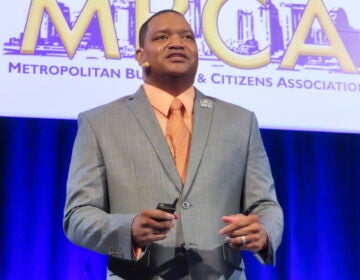Are insurance adjusters lowballing estimates for Superstorm Sandy claims?
Listen
Contractor Larry Steimel reviews the insurance adjuster estimate of one of his clients whose home was flooded during Sandy.
As a general contractor who specializes in insurance repairs, Larry Steimel with Pequannock-based LA Design and Construction has had a front-row seat to some of the problems people have had rebuilding their homes. The biggest hurdle after Sandy, he says, has been the inflexibility of insurance adjusters when it comes to paying people’s claims.
Take the case of Judy Hickerson, one of his clients who lives in the Waretown section of Ocean Township in Ocean County. An adjuster from a firm called Colonial Claims — which was hired by Hickerson’s insurance company — calculated that it would cost $73,000 to repair the flooded home. But when Steimel did his own inspection, using a similar software program and tabulating the damage using industry-set rates, his figure totaled nearly twice that amount.
Looking at a line-by-line comparison of the estimates, he said Colonial appeared to have come up with its numbers by cutting corners wherever it could. What’s more, he said Hickerson’s case is hardly unique. Of the 25 or 30 Sandy victims he’s worked with, nearly everyone had similar problems.
FEMA agreed last month to reopen up to 144 thousand flood-insurance claims from Sandy victims who feel they weren’t paid enough for their damage. Since flood insurance settlements are paid using federal taxpayer money, private insurers handling the claims have little incentive to deny payouts, so it’s unclear even to many closely following the developments why companies would unfairly deny claims. Regardless, there’s a growing acknowledgement that it’s a matter of concern.
The widening scandal has focused so far on engineering reports that were allegedly rewritten to reduce or deny coverage. But Steimel and others involved with the storm recovery worry there may be a much larger issue with people’s insurance adjuster estimates, where problems may be harder to prove. Policyholder advocates say it’s important that the federal government is thorough in its investigations so all such cases of policyholders being shortchanged are identified and remedied.
Steimel says he’s seen all sorts of issues. Often, insurance companies only agreed to pay for damage below the water line, even if the entire house was filled with mold. In another instance, the adjuster refused to include payment for debris removal, even though the town had stopped picking up storm debris.
“You could go to two claims right next door to each other and find two different adjusters and two different ways that they settled things,” he said. “Same kinds of damage. Two different logics. There was just no consistency.”
In Hickerson’s case, he estimated it would cost more than $5,000 to clean and repair the house’s siding, which had been underwater. But Colonial refused to pay for siding.
“I think for the most part, all they would allow for was a pressure washing on the outside of the house,” Steimel said. “But meanwhile, it was submerged in salt water, which is corrosive and very damaging to plywood, sheathing, and so on.”
Hickerson’s estimate also didn’t include coverage for exterior paint. And it didn’t account for sales tax.
Steimel said there’s no way in good conscience he could have rebuilt the house as the insurance company suggested.
“What would be wrong with that would be a house that one: is contaminated. When you get involved in stormwater, not cleaning that could have caused health problems. And two: they would start to see defects in the house. The wood starts to show the warping, the nails are rusted out, the siding starts to pop. So it would have been a substandard job.”
Steimel and the Hickersons tried negotiating with Colonial, but they made little progress.
“Some of the exchanges that we had with the adjuster were very unprofessional. You know, downright nasty. Very sarcastic and very confrontational,” Steimel said. “Instead of trying to settle and trying to get these people whole, the whole time what they did is try to get them away from the contractor. She even tried to cast aspersions on our company, that we were somehow taking advantage, or that they should beware of us. Meanwhile, we have an excellent reputation.”
Colonial didn’t respond to a request for comment.
Meanwhile, Hickerson recently filed a lawsuit against Wright Flood, her insurance company.
“Under FEMA privacy rules, we are not permitted to publicly address an individual claim and speak to the same,” Wright said in an emailed statement. “We cannot comment on the accuracy of anything that has here been alleged, as we are not permitted to do so.” The company pledged, however, to review complaints from any of its policyholders.
Echoing what insurers have long maintained, Donald Griffin with PCI — an insurance industry trade group — said that such disputed settlements are generally the exception to the rule.
“There’s always the feeling that insurance companies are trying to slight the customer in some way. What I can tell you is that’s not the case,” he said. “The only time you really test your relationship with the consumer when you’re an insurance company is when they have a claim. And the companies want to do absolutely everything they possibly can to make sure that customer is as happy as they can be within the terms of the contract, because if you’re not, you’re going to go somewhere else.”
He noted that flood insurance — unlike other types of insurance — is paid using federal taxpayer money, so private adjusters and companies processing the claims would have no financial incentive to shortchange their customers. Critics acknowledge that’s true, and while they have a number of theories and partial explanations, no one knows for sure exactly why this is happening.
Recent attention has focused on insurance companies doctoring engineering reports to reduce payouts, but Chip Merlin, an attorney representing hundreds of Sandy victims in New Jersey, says the scope of that problem is limited by the fact that only 14-percent of cases even included engineering inspections. He thinks the issues with adjuster estimates represent a potentially much bigger problem.
“One hundred percent of all claims have estimates,” he said. “If you can’t trust the engineering report, why should you trust the estimate? And everybody’s got an estimate.”
As a result of the engineering scandal, FEMA has asked insurance companies to turn over drafts of all inspection reports to see if anything was changed to wrongfully deny policyholders coverage. And all twelve members of New Jersey’s Congressional delegation are now calling for federal hearings on FEMA’s response to the fraud allegations.
But with the adjuster estimates, there’s often no similar paper trail. Most of the concerns revolve around how the estimates were written in the first place, so it could be harder to prove there was any wrongdoing. While FEMA has said its investigations won’t be limited to the engineering reports, it remains to be seen how thorough the agency’s review of cases will be. Amy Bach with United Policyholders — an insurance consumer advocacy group — is among those eagerly awaiting further details.
“They’re going to have to be mechanical about it and look at things like ‘Was sales tax withheld? Was overhead and profit improperly withheld? Were the allowances for paint accurate to the actual cost of paint in that area at that time?’” she said. “That’s nit-picky, slow work, but if it doesn’t get done, then the re-opens won’t yield anything.”
“I don’t think anyone is going to see any kind of windfall here,” she added. “But I certainly hope that if the right standards are applied to the reopen and review process and the right experts participate in reviewing the estimates in the files, New Jersey homeowners impacted by Sandy who have flood insurance should definitely see more money.”
________________________________________________________
NJ Spotlight, an independent online news service on issues critical to New Jersey, makes its in-depth reporting available to NewsWorks.
WHYY is your source for fact-based, in-depth journalism and information. As a nonprofit organization, we rely on financial support from readers like you. Please give today.




